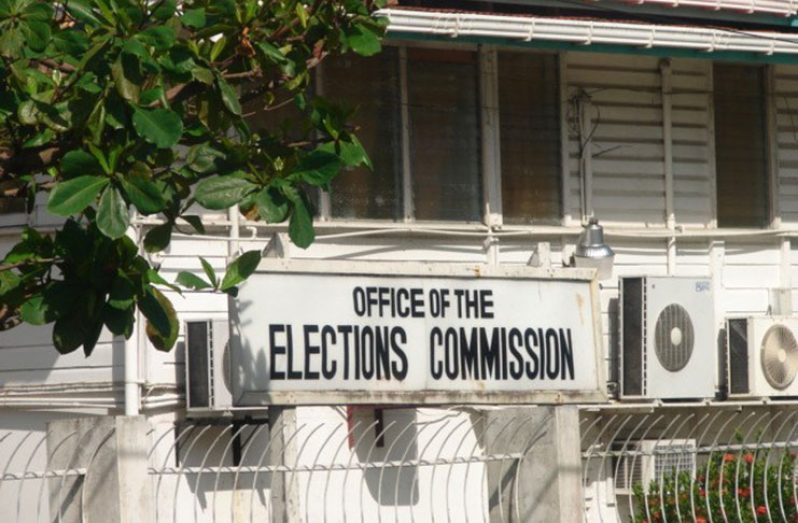…says would not sacrifice credibility for expediency
THE Guyana Elections Commission (GECOM) has rubbished claims by its former Deputy Chief Elections Officer that elections could have been held within the 90-day period, saying that it no longer has a pool of trained election day staff as this policy was scrapped in 2016 and that it will not sacrifice credibility for expediency.
Vishnu Persaud, former DCEO was quoted as saying in a Stabroek News article dated 14th March 2019 under the caption “GECOM was in position to hold polls in 90 days.” According to GECOM, Persaud even pontificated that the elections could have bene held and there was even time to spare in that 90 days period. However, in a sharp response GECOM said “It is incomprehensible and mystifying that Mr. Persaud spent more than 16 years at the commission and has now resorted to peddling inaccurate information in the public domain.”
The commission said while it had explored the possibility of having a pool of trained persons who could have been used for elections whenever the need should arise, that policy decision was thrown out after the 2016 Local Government Elections. “GECOM fully advertised in 2018 extensively and trained persons countywide. The need for rigorous training cannot be over emphasised. Conducting elections is not equivalent to running a cake shop,” the commission said in a statement responding to Persaud’s claims.
According to the electoral body it ought not to be blamed for human error and creating any avenue for the results of the elections to be discredited. “GECOM did not utilise a pool for the 2018 Local Government Elections. Extensive advertising was done and also intense training, but yet there were shortfalls. The commission had to re-advertise and many areas were revisited for a second round of training. The success resulted in a cadre of trained persons who delivered with excellence,” the commission’s statement read.
It emphasises that Local Government Elections is different from General and Regional Elections, noting that while some methodologies are the same at polling stations, persons must be properly trained to understand context and deliver within the legal framework (Chapter 28:03 and Chapter 1:03). “In our quality assurance analysis, it was determined that the magnitude of content to be presented by the trainers would be strenuous for two persons. Even participants get tired. Training teams function best in groups of three. The GECOM Secretariat has presented work plans to the commission with all the possible options available for the conduct of General and Regional Elections. Training is the longest activity in all options. It is that critical,” the statement added.
According to the commission, it had previously recognised that the conduct of elections would require at least 180 days, noting that former Chairman, Dr Steve Surujbally, in correspondence to former Head of the Presidential Secretariat, Dr Roger Luncheon on October 17, 2014 under the caption “GECOM?s Commitment to Satisfying its Constitutional Mandate” wrote “Further, it must be noted that the commission has publicly stated that when the decision to hold Local Government Elections is officially communicated to us, a period of six (6) months is required to allow our secretariat to complete essential prerequisite activities to ensure GECOM’s compliance with all related legislation and regulations, and satisfying the necessary administrative requirements as has(sic) been established.”
The electoral body said while it is cognisant that the Constitution dictates 90 days for elections following the successful passage of a motion of confidence against the government, it can only deliver within a timeframe that is practical and within the confines of the legal and procedural requirements as outlined in Chapter 1:03. “As the old proverb said, ‘Once bitten twice shy’ Chief Election Officer, Keith Lowenfield was right when he declared publicly that he was awaiting the commission’s instruction to move into operational mode.”
The commission said Persaud’s reasoning of the CEO’s capabilities to “mobilise in the sense of beginning training” since 22nd December, 2018 lacks merit. It said guidance should be sought from the Representation of the People’s Act on the commission’s roles and responsibilities to the secretariat.
Article 161A (2) of the Constitution states, “The Elections Commission may, by directions in writing and subject to such conditions as it thinks fit, delegate any of its powers under paragraph 1 to any one or more members of the commission, or by such directions and subject to such conditions as it thinks fit, delegate such powers to such officers of the commission as the commission may determine.” “It must be reiterated, that this commission has never backed down from executing its Constitutional mandate and does not intend to do so now. All legal and procedural mandates must be implemented for the delivery of free, fair and credible elections.”




.png)









